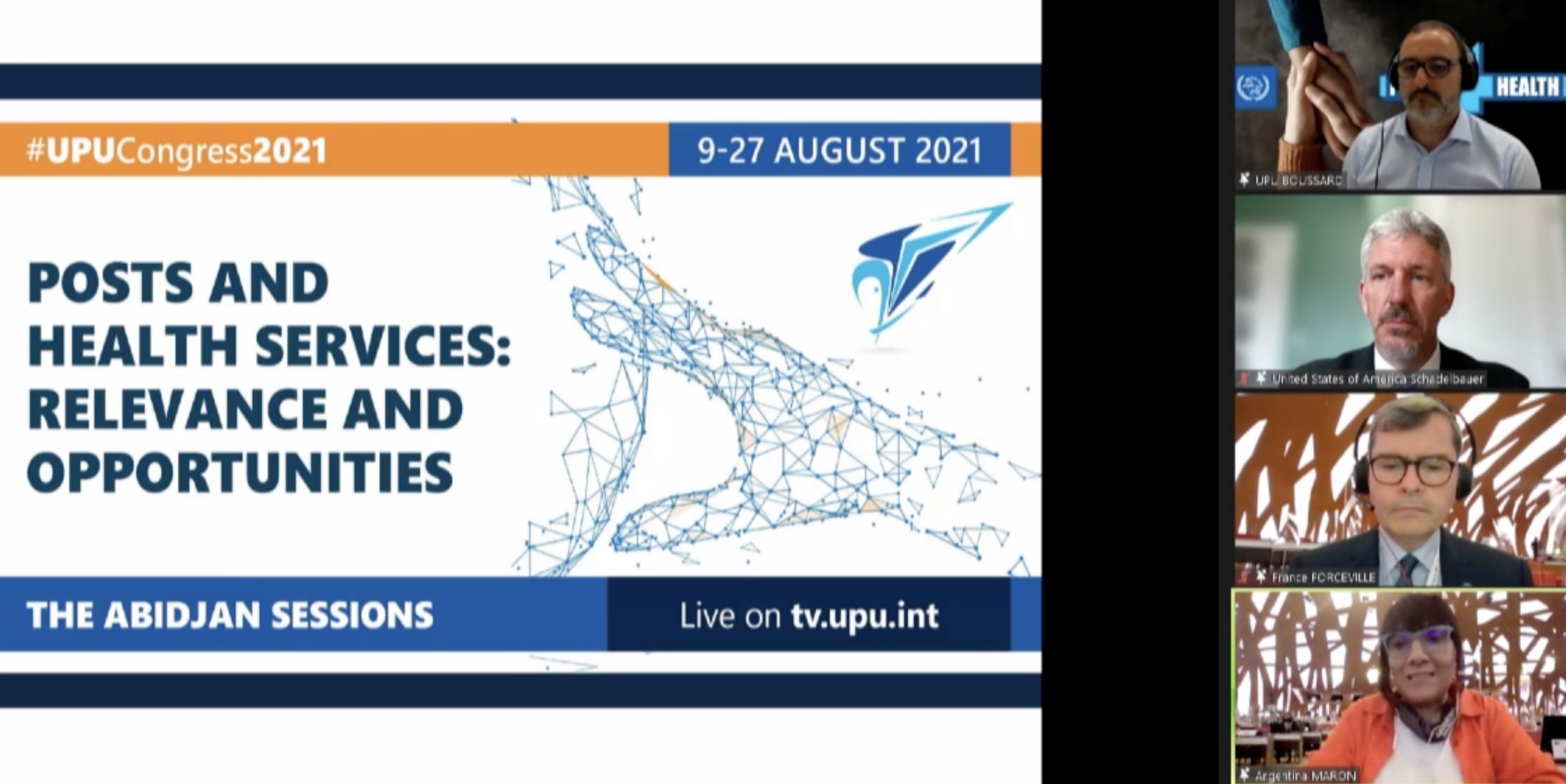The second week of the 27th Universal Postal Congress in Abidjan, Cote d’Ivoire opened with a discussion on the opportunities for posts to diversify into the health sector. Triggered by the ongoing global health crisis, the discussion, however, went beyond the pandemic.
Although Posts’ role as a provider of economic and social services has always been an irrefutable fact, the scope and the prominence of the Post’s involvement in ensuring timely responses to the COVID-19 pandemic has surprised many. “Sometimes, we can’t think of the Post as a provider of health services,” said Marcela Maron, Director of Postal Regulation, Argentina, “But we were there. We were among the first, and the Post showed its deep commitment to the quickest rollout of life-saving deliveries.”
From the delivery of personal protective equipment (PPE) and essential medicines, money transfers and payment of social benefits to online shopping and advanced e-commerce channels – posts have been able to prove that they are more than mail.
Following the initial shock that pushed posts into unchartered waters, it soon became clear that when it comes to the inclusive and efficient provision of health services, posts are here to stay. At present, postal operators in every country are working tirelessly to support the rapid rollout of and universal access to precious vaccines against COVID-19. According to Ms. Maron, Correo Argentino has already distributed over 40 million vaccine doses to the Argentinian population – a number that continues to grow exponentially when new supplies become available.
The recent study by the Office of the Inspector General (OIG), United States Postal Service (USPS), “Partnering for Health: Potential Postal Service Roles in Health and Wellness” presented a careful re-examination of the USPS’ traditional health portfolio and identified its potential role in driving national recovery efforts, including vaccine distribution, storage and staging.
Speaking from across the Atlantic, Rick Schadelbauer, Research Specialist at the OIG, stressed that the lack of appropriate facilities, regulation and related costs can be barriers for posts when entering non-core business areas. These, however, can be overcome with the help of cross-sector partnerships and trust, historically enjoyed by posts with customers.
Remarkably, posts’ role in raising awareness and combatting “disinfodemic” – the global fight led by the United Nations – has been highlighted by all experts. “With this trust and familiarity, I think the postal service is a strong partner in providing health and wellness services and people would embrace that,” added Mr. Schadelbauer.
Jean-Paul Forceville, Director of European and International Relations at the French La Poste Group and Chair of PostEurop, confirmed that the trend of a deeper postal diversification into health is truly global. “Our conclusions are very similar,” said Mr. Forceville, “We know how important trust is when it comes to any kind of healthcare, and we are trying to be a trusted third-party that brings together physical and digital services.”
La Poste Group has indeed come a long way in terms of actual “diversification.” At the moment, the French postal operator’s activities in health extend way beyond PPE and vaccine delivery to cover “BioLogistic” of temperature-sensitive products, applications for remote aftercare at home, hosting population’s personal healthcare data and even providing loans for building health infrastructures through La Banque Postale. For the majority of these groundbreaking postal solutions, digitalization is key. “What people need is changing: now, many more people prefer staying at home as long as possible instead to going to a medical facility. Here, technology is making things easier for us,” believes Mr. Forceville.
While considering this kind of diversification, the question that many operators would ask themselves is the one of whether it all eventually makes business sense. Mr. Forceville is convinced that it does: “We believe that we are well-placed to drive the traffic in e-health, and still generate profit.”
There is no doubt that the future is promising for posts in healthcare, as building back better after the pandemic is gradually replacing the focus on immediate responses. In this respect, the UPU’s role as a knowledge bank and the catalyzer of change is becoming ever more prominent. “The UPU operates the largest logistical network in the world. The time is now for us to seize the moment and mobilize this network to show that postal services are, indeed, essential ones,” said Ms. Maron.
Anticipating this call from the global postal community, in 2020, the UPU created Post4Health – a flexible multi-stakeholder platform for donors that aims to increase synergies and create a unique ecosystem to not only help deliver responses to the current pandemic, but also to provide broader health services through the Post.
Mr. Olivier Boussard, Coordinator of Resource Mobilization and Stakeholder Engagement at the UPU, who was facilitating the Monday’s discussion, commended the commitment of the French La Poste Group and the Ministry of Internal Affairs and Communication of Japan (MIC), who were the first to support this timely initiative, and called on other countries to join these efforts.
As is the case with many crisis-driven innovations, the challenge for posts now is to grab the momentum and ensure that the postal sector’s development into health is coordinated, harmonized and a win-win for customers and business partners. “I believe that we can go above and beyond this pandemic,” concluded Ms. Maron.
***
To join the UPU’s efforts in public health and support Post4Health facility, contact us at post4health@upu.int and learn more on a dedicated project page.
